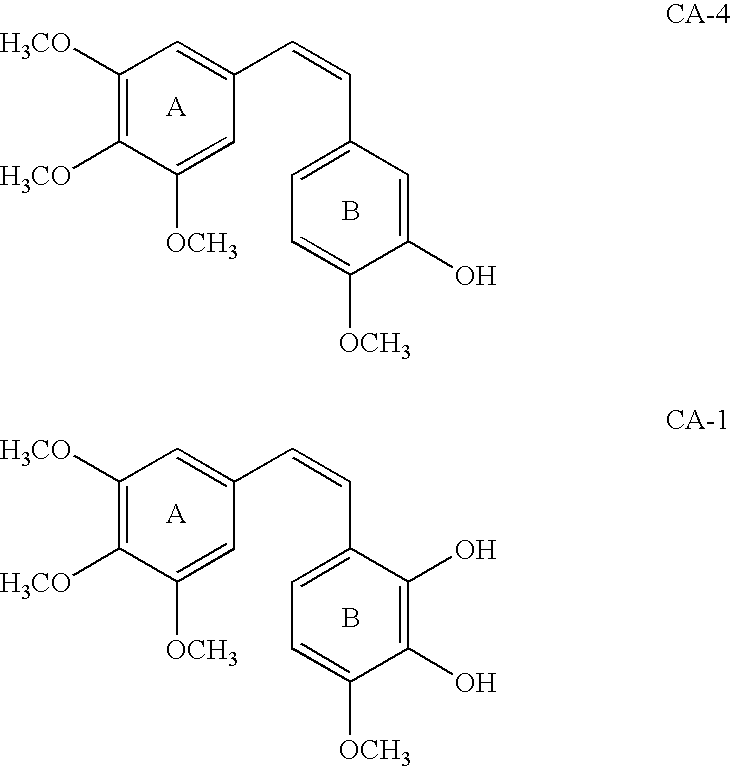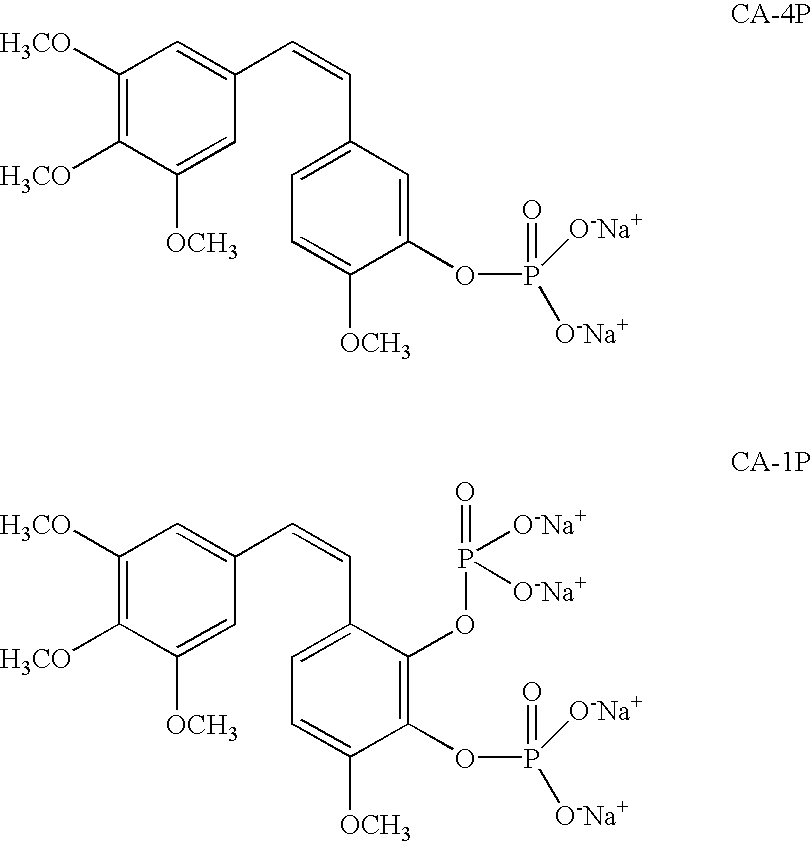Functionalized stilbene derivatives as improved vascular targeting agents
a technology of functionalized stilbene and targeting agent, which is applied in the direction of drug compositions, phosphorous compound active ingredients, peptide/protein ingredients, etc., can solve the problems of the inability of the microvessel to sustain blood flow and the death of the surrounding tumor tissu
- Summary
- Abstract
- Description
- Claims
- Application Information
AI Technical Summary
Problems solved by technology
Method used
Image
Examples
example 1
2'Hydroxy-3'-bromo-3,4,4',5-tetramethoxy-(Z)-stilbene (ZSB-26A)
[0093] 12
[0094] A. Preparation of 3,4,5-trimethoxybenzyltriphenylphosphonium bromide
[0095] To a well-stirred solution of CBr.sub.4 (5.10 g, 15.4 mmol) in acetone (80 mL) at 0.degree. C. under N.sub.2,3,4,5-trimethoxybenzyl alcohol (2.23 g, 11.3 mmol) and triphenylphosphine (4.00 g, 15.3 mmol) were added. After 12 hours, the mixture was filtered through Celite and the solvent removed under reduced pressure to yield benzyl bromide as a brown oil. This oil was then dissolved in CH.sub.2Cl.sub.2 (50 mL) and PPh.sub.3 (3.25 g, 12.4 mmol) was added. The reaction was heated overnight and then ice-cold water was added and the product isolated by extraction with CH.sub.2Cl.sub.2. The organic phase was washed with brine and dried over sodium sulfate. Evaporation of the solvent in vacuo resulted in a crude solid, which was recrystallized from ethyl alcohol / hexane to afford 3,4,5-trimethoxybenzyltriphenyl phosphonium bromide (5.0 g,...
example 2
2'-Disodium Phosphate-3'-bromo-3,4,4',5-tetramethoxy-(Z)-stilbene (ZSB-26B)
[0104] 13
[0105] A. Preparation of 2-O-Bis(benzyl)phosphoryl-3-bromo-3,4,4',5-tetram-ethoxy-(Z)-stilbene
[0106] 2'-hydroxy-3'-bromo-3,4,4',5-tetramethoxy-(Z)-stilbene (250 mg, 0.63 mmole) was dissolved in acetonitrile(10 ml) in a flask equipped with a septum, thermometer and argon inlet. After cooling to -25.degree. C., carbon tetrachloride(5 eq. 3.15 mmole, 0.6 ml) was added and the solution was stirred for 5 min. With a syringe, diisopropylethylamine (0.65 ml, 2 eq.) was added followed by DMAP(18 mg. 0.3 eq, 0.15 mmole). Slow addition of dibenzyl phosphite(0.25 ml, 1.26 mmole, 2.0 eq.) was begun 1 min later at such a rate the reaction temperature remained below -20.degree. C. After completion of the reaction(in 1 hour by TLC analysis), 0.5M KH.sub.2PO.sub.4 was added(5 ml), and the solution was allowed to warm to room temperature and extracted with ethyl acetate (3.times.20 ml). The combined solvent extract w...
example 3
2', 3'-Dinitro-3,4,4',5-tetramethoxy-(Z)-stilbene (ZSB-3B)
[0109] 14
[0110] 4-methoxy-2,3-dinitrobenzaldehyde (2.94 mmol) and 3,4,5-trimethoxybenzyltriphenyl phosphonium bromide (1.54 g, 2.94 mmol, 1.0 equiv) in anhydrous dichloromethane (25 mL) was added NaH (0.424 g, 17.67 mmol, 6.0 equiv). The reaction mixture was stirred at room temperature for about 7 hours and monitored by TLC. The reaction was quenched by adding water, the organic layer was separated and the aqueous layer was extracted with dichloromethane (3.times.25 mL). The combined organic layer was washed with brine, dried over Na.sub.2SO.sub.4 and concentrated in vacuo to orange colored slush. To this was added about 15 mL of dichloromethane and refrigerated overnight. The crude mixture was subjected to flash chromatography to isolate 2',3'-Dinitro-3,4,4',5-tetra-methoxy-(Z)-stilbene (0.581 g, 1.48 mmol, 51%, solid) .sup.1H NMR (300 MHz, CDCl.sub.3): .delta. 3.69 (6H, s), .delta. 3.82 (3H, s), .delta. 3.95 (3H, s), .delta...
PUM
| Property | Measurement | Unit |
|---|---|---|
| temperature | aaaaa | aaaaa |
| temperature | aaaaa | aaaaa |
| thickness | aaaaa | aaaaa |
Abstract
Description
Claims
Application Information
 Login to View More
Login to View More - R&D
- Intellectual Property
- Life Sciences
- Materials
- Tech Scout
- Unparalleled Data Quality
- Higher Quality Content
- 60% Fewer Hallucinations
Browse by: Latest US Patents, China's latest patents, Technical Efficacy Thesaurus, Application Domain, Technology Topic, Popular Technical Reports.
© 2025 PatSnap. All rights reserved.Legal|Privacy policy|Modern Slavery Act Transparency Statement|Sitemap|About US| Contact US: help@patsnap.com



